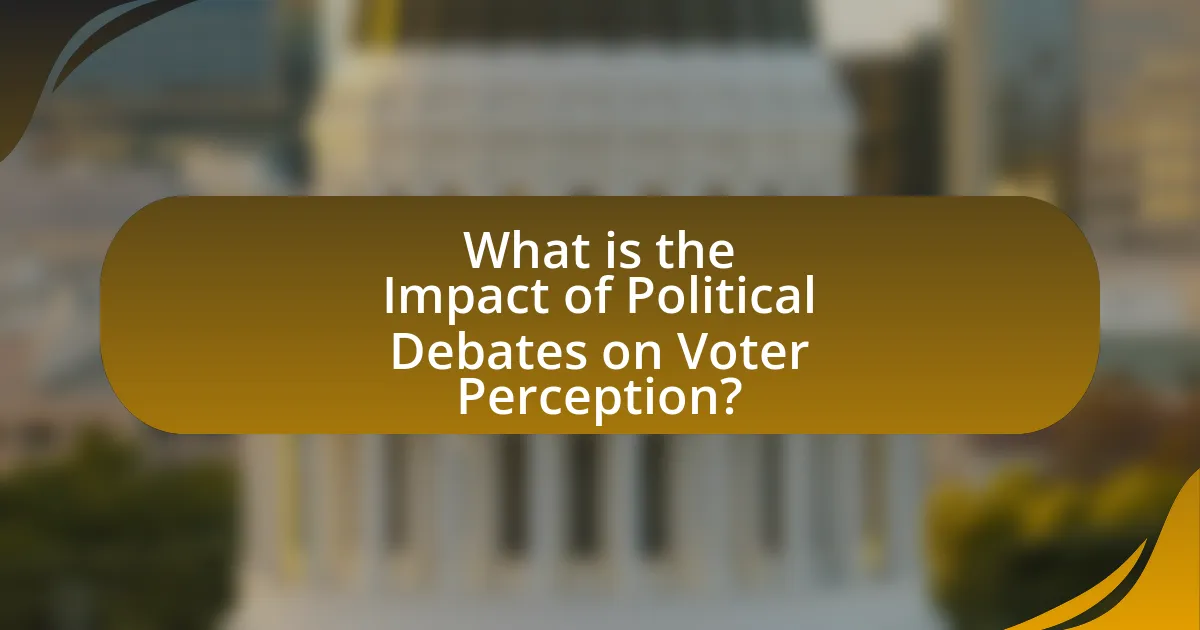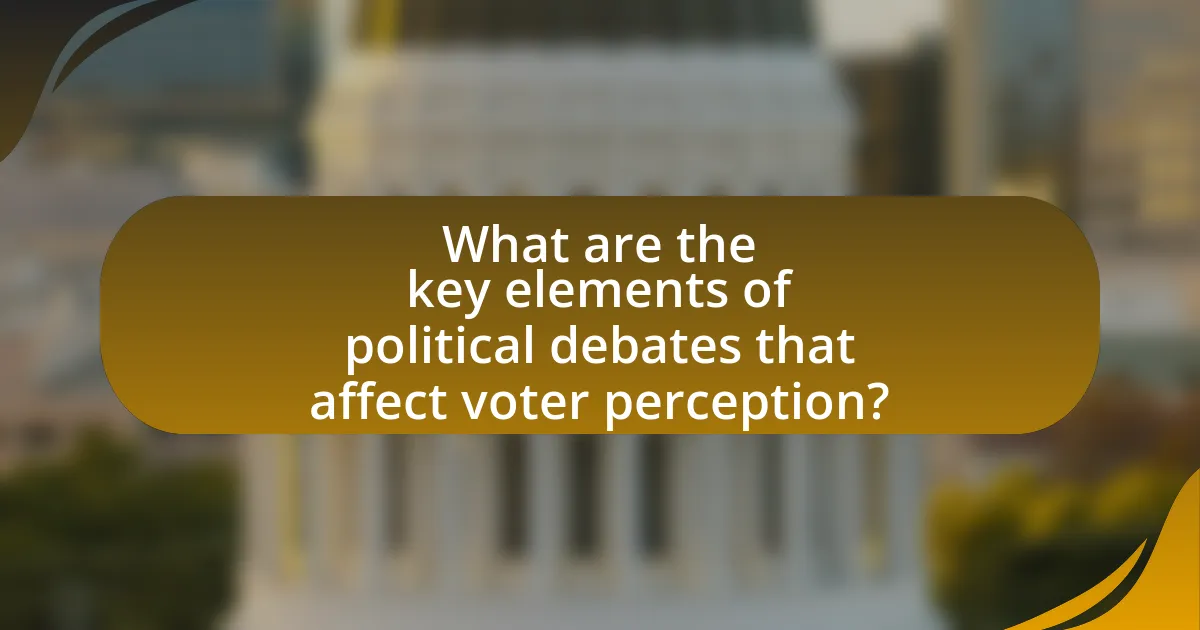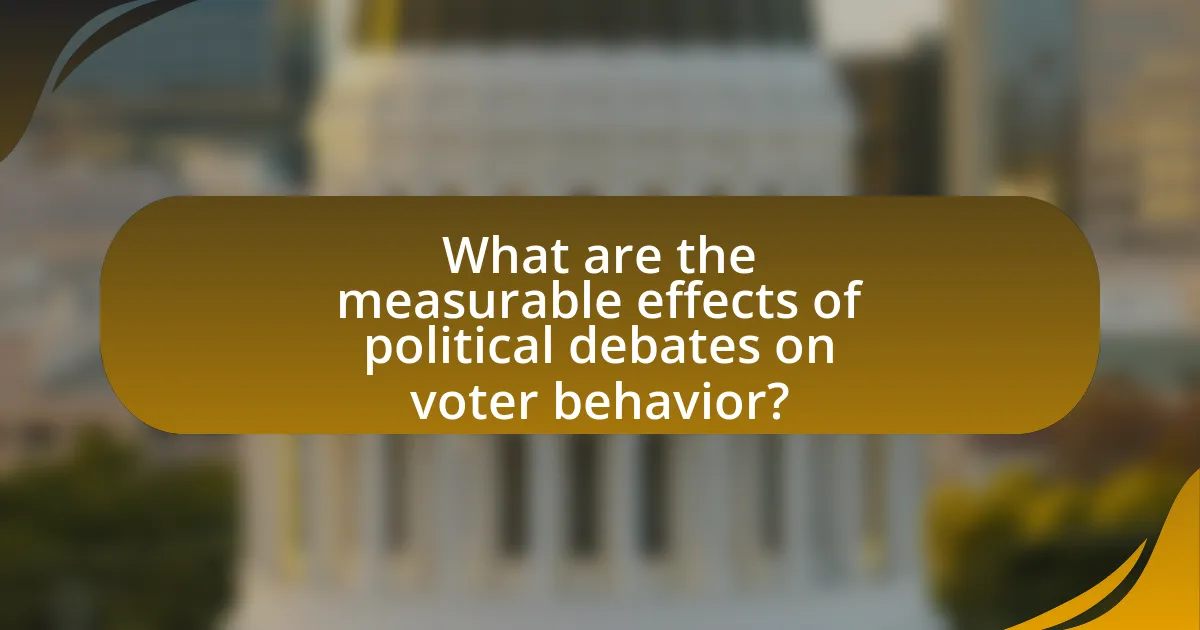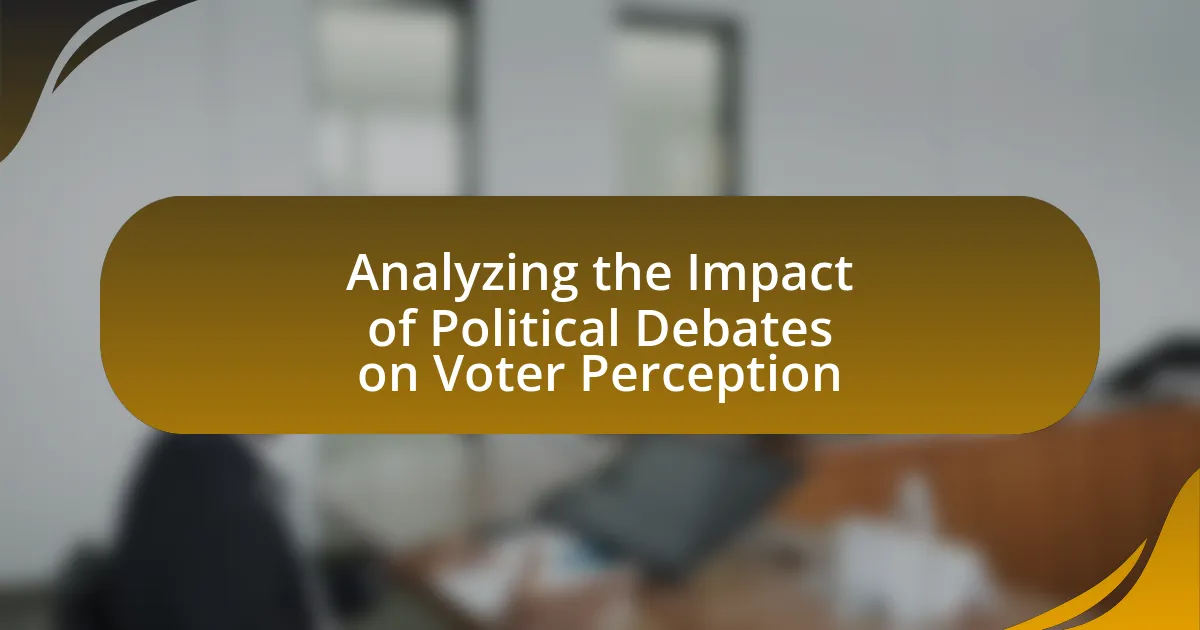The article analyzes the impact of political debates on voter perception, highlighting how these events shape opinions, clarify candidate positions, and influence emotional responses. Research indicates that debates can sway undecided voters, with a significant percentage reporting changes in their opinions based on candidates’ performances. Key elements affecting voter perception include candidates’ communication styles, issue framing, and the debate format, all of which contribute to shaping public opinion and electoral outcomes. The article also explores the psychological factors at play, the measurable effects on voter behavior, and best practices for candidates to maximize their impact during debates.

What is the Impact of Political Debates on Voter Perception?
Political debates significantly influence voter perception by shaping opinions, highlighting candidate positions, and affecting emotional responses. Research indicates that debates can sway undecided voters, with studies showing that 67% of viewers reported changing their opinions based on debate performances. Additionally, debates provide a platform for candidates to clarify their policies, which can enhance voter understanding and engagement. For instance, a study by the Pew Research Center found that 54% of debate watchers felt more informed about the candidates’ views after watching a debate. This demonstrates that political debates play a crucial role in informing and influencing voter decisions.
How do political debates influence voter opinions?
Political debates significantly influence voter opinions by providing a platform for candidates to present their policies and engage directly with opponents. During these debates, voters assess candidates’ communication skills, knowledge, and demeanor, which can sway their perceptions and decisions. Research indicates that approximately 70% of viewers report that debates impact their voting choices, particularly when candidates address key issues relevant to the electorate. For instance, a study by the Pew Research Center found that debates can shift voter preferences, especially among undecided voters, highlighting the debates’ role in shaping public opinion and electoral outcomes.
What psychological factors are at play during political debates?
Psychological factors at play during political debates include cognitive biases, emotional responses, and social identity influences. Cognitive biases, such as confirmation bias, lead participants and viewers to favor information that aligns with their pre-existing beliefs, affecting their interpretation of candidates’ arguments. Emotional responses, including fear and enthusiasm, can significantly sway audience perception, as candidates who evoke strong emotions are often remembered more vividly. Additionally, social identity influences, where individuals align their views with those of their social groups, can shape opinions and reactions during debates. Research indicates that these factors collectively impact voter perception and decision-making, as evidenced by studies showing that emotional engagement can enhance recall of debate content and influence voting behavior.
How do debates shape voters’ perceptions of candidates?
Debates shape voters’ perceptions of candidates by providing a platform for direct comparison of their policies, personalities, and communication skills. During debates, candidates articulate their positions on key issues, allowing voters to evaluate their competence and credibility. Research indicates that candidates who perform well in debates often experience a boost in poll numbers; for instance, a study by the Pew Research Center found that 63% of debate watchers reported that the debates influenced their opinions about the candidates. Additionally, debates can highlight contrasts between candidates, making it easier for voters to align with those who reflect their values and priorities.
Why are political debates significant in the electoral process?
Political debates are significant in the electoral process because they provide a platform for candidates to present their policies, engage with opponents, and directly address voter concerns. This interaction allows voters to evaluate candidates’ communication skills, critical thinking, and ability to handle pressure, which are essential traits for leadership. Research indicates that debates can influence voter perceptions and decisions; for instance, a study by the Pew Research Center found that 67% of debate watchers reported that the debates helped them make a more informed choice in the 2020 presidential election. Thus, political debates play a crucial role in shaping public opinion and ultimately impacting electoral outcomes.
What role do debates play in informing voters?
Debates play a crucial role in informing voters by providing a platform for candidates to present their policies, values, and responses to pressing issues. This direct interaction allows voters to compare candidates side-by-side, facilitating informed decision-making. Research indicates that 70% of voters report that debates significantly influence their understanding of candidates’ positions (Pew Research Center, 2020). Additionally, debates often highlight differences in policy approaches, enabling voters to assess which candidate aligns more closely with their beliefs and needs.
How do debates affect voter turnout and engagement?
Debates significantly increase voter turnout and engagement by providing a platform for candidates to present their policies and engage with opposing viewpoints. Research indicates that televised debates can boost voter interest, with a study by the Pew Research Center showing that 63% of viewers reported being more informed about the candidates after watching a debate. Additionally, debates often serve as a catalyst for discussions among voters, leading to increased participation in the electoral process. The heightened visibility of candidates and their positions during debates can mobilize undecided voters, as evidenced by a 2016 study from the American Political Science Review, which found that debates can sway voter preferences and increase overall electoral participation.

What are the key elements of political debates that affect voter perception?
The key elements of political debates that affect voter perception include candidates’ communication style, issue framing, body language, and the effectiveness of their arguments. Candidates’ communication style, such as clarity and confidence, significantly influences how voters perceive their competence; for instance, studies show that articulate candidates are often viewed as more trustworthy. Issue framing, or how candidates present their policies, shapes voter understanding and prioritization of issues, impacting their preferences. Body language also plays a crucial role; non-verbal cues can convey sincerity or aggression, affecting emotional responses from the audience. Lastly, the effectiveness of arguments, supported by facts and logical reasoning, can sway undecided voters, as evidenced by research indicating that well-supported claims resonate more with the electorate.
How does the format of a debate influence voter reactions?
The format of a debate significantly influences voter reactions by shaping perceptions of candidates’ credibility and communication skills. For instance, structured formats, such as town hall meetings, allow for direct interaction with voters, fostering a sense of connection and relatability, which can enhance a candidate’s appeal. Conversely, more formal formats, like traditional podium debates, may emphasize performance over substance, leading voters to focus on style rather than policy. Research indicates that voters are more likely to favor candidates who appear confident and articulate in these formats, as evidenced by a study from the Pew Research Center, which found that 67% of viewers rated candidates based on their debate performance rather than their policies. Thus, the debate format plays a crucial role in shaping voter perceptions and decisions.
What are the different formats of political debates?
The different formats of political debates include town hall meetings, one-on-one debates, panel discussions, and moderated forums. Town hall meetings allow candidates to engage directly with voters in an informal setting, fostering personal connections. One-on-one debates typically feature two candidates discussing key issues, often with a moderator guiding the conversation, which allows for direct comparison of their policies. Panel discussions involve multiple candidates or experts discussing various topics, providing a broader perspective on issues. Moderated forums are structured events where candidates answer questions from a moderator, ensuring a focused dialogue on specific subjects. Each format influences voter perception by shaping how candidates present their ideas and interact with the electorate.
How do audience interactions impact the debate’s effectiveness?
Audience interactions significantly enhance a debate’s effectiveness by fostering engagement and providing immediate feedback. When audiences react—through applause, laughter, or vocal responses—they create a dynamic atmosphere that can influence the debaters’ performance and the overall perception of the arguments presented. Research indicates that debates with active audience participation tend to resonate more with viewers, as evidenced by a study from the Pew Research Center, which found that 65% of participants felt more connected to candidates who engaged directly with the audience. This interaction not only energizes the debate but also helps to clarify key points, making them more memorable for voters.
What rhetorical strategies do candidates use during debates?
Candidates use various rhetorical strategies during debates, including ethos, pathos, and logos. Ethos establishes credibility, as candidates often highlight their qualifications and experience to gain voter trust. Pathos appeals to emotions, where candidates share personal stories or use evocative language to connect with the audience on an emotional level. Logos involves logical reasoning, where candidates present facts, statistics, and logical arguments to persuade voters. For example, during the 2020 presidential debates, candidates utilized these strategies to address key issues like healthcare and the economy, aiming to resonate with voters’ concerns and values.
How do candidates’ speaking styles affect voter perception?
Candidates’ speaking styles significantly influence voter perception by shaping how voters interpret their credibility, relatability, and overall appeal. For instance, research indicates that candidates who employ a conversational tone and use personal anecdotes tend to be perceived as more relatable and trustworthy, which can enhance voter support. A study published in the Journal of Politics by K. A. McGraw and J. A. McGowan found that candidates who articulate their messages clearly and confidently are often viewed as more competent, leading to increased favorability among voters. Additionally, non-verbal cues, such as body language and eye contact, further impact how voters perceive a candidate’s sincerity and engagement, reinforcing the importance of effective speaking styles in political contexts.
What types of arguments resonate most with voters?
Emotional appeals resonate most with voters. Research indicates that arguments invoking strong emotions, such as fear, hope, or empathy, significantly influence voter decision-making. For instance, a study published in the journal “Political Psychology” found that emotionally charged messages can increase voter engagement and sway opinions more effectively than purely factual arguments. Additionally, personal stories and relatable experiences often create a connection that enhances the persuasiveness of a candidate’s message, as evidenced by numerous successful political campaigns that utilized storytelling to resonate with their audience.

What are the measurable effects of political debates on voter behavior?
Political debates significantly influence voter behavior by shaping perceptions, altering candidate favorability, and impacting voter turnout. Research indicates that debates can lead to a measurable shift in public opinion; for instance, a study by the Pew Research Center found that 63% of viewers reported changing their opinion about a candidate after watching a debate. Additionally, debates often highlight key issues, which can mobilize voters who feel strongly about those topics, as evidenced by a 2016 analysis showing increased voter turnout in states where debates were held. Furthermore, debates can enhance candidate visibility, with candidates who perform well often experiencing a spike in polling numbers immediately following the event.
How do debates impact polling data before and after events?
Debates significantly influence polling data both before and after the events. Prior to debates, polling data often reflects voter sentiment based on candidates’ previous performances and campaign strategies. For instance, a candidate may experience a surge in support leading up to a debate due to heightened media coverage and anticipation. After the debate, polling data typically shifts as voters reassess their preferences based on candidates’ performances during the event. Historical evidence shows that candidates like Barack Obama saw a notable increase in polling numbers following his debate performances in 2008, illustrating how effective debate delivery can sway public opinion.
What trends can be observed in voter preferences following debates?
Voter preferences often shift significantly following political debates, with trends indicating increased support for candidates who perform well in these forums. Research shows that candidates perceived as more charismatic or knowledgeable during debates typically experience a boost in poll numbers. For instance, a study by the Pew Research Center found that after the 2020 presidential debates, Joe Biden saw a 5% increase in voter support, while Donald Trump’s support decreased by a similar margin. Additionally, undecided voters frequently report being swayed by debate performances, highlighting the debates’ role in shaping public opinion and influencing electoral outcomes.
How do debates influence undecided voters specifically?
Debates influence undecided voters by providing a platform for candidates to articulate their policies and respond to opponents in real-time, which can clarify voter preferences. Research indicates that undecided voters often seek information that aligns with their values and concerns, and debates serve as a critical moment for candidates to address these directly. For instance, a study by the Pew Research Center found that 63% of undecided voters reported that debates helped them make a decision by highlighting differences between candidates. This direct engagement allows undecided voters to evaluate candidates’ communication styles, credibility, and ability to handle pressure, further shaping their voting choices.
What are the long-term effects of political debates on voter loyalty?
Political debates significantly influence long-term voter loyalty by shaping perceptions of candidates and their policies. Research indicates that debates provide a platform for candidates to articulate their positions, which can lead to increased identification with a party or candidate among viewers. For instance, a study by the Pew Research Center found that 67% of debate watchers reported feeling more favorable toward a candidate after viewing a debate, suggesting that effective performance can solidify voter allegiance. Additionally, debates often highlight contrasts between candidates, reinforcing partisan divides and encouraging voters to remain loyal to their chosen party over time. This effect is particularly pronounced among undecided voters, who may make lasting decisions based on debate performances.
How do debates contribute to the formation of party allegiance?
Debates significantly contribute to the formation of party allegiance by providing a platform for candidates to articulate their policies and values directly to voters. This direct engagement allows voters to assess candidates’ positions, compare them with their own beliefs, and make informed decisions about party affiliation. Research indicates that voters often solidify their party allegiance after witnessing debates, as they can identify with candidates who resonate with their views or challenge their existing beliefs. For instance, a study by the Pew Research Center found that 67% of debate viewers reported that the debates influenced their opinions about candidates, reinforcing their loyalty to a particular party.
What is the relationship between debate performance and future voting behavior?
Debate performance significantly influences future voting behavior, as voters often use candidates’ debate performances as a key indicator of their competence and suitability for office. Research indicates that candidates who perform well in debates can experience a measurable increase in voter support; for instance, a study by the American Political Science Review found that debate winners typically see a boost in their poll numbers by an average of 3 to 5 percentage points. This correlation suggests that effective communication and persuasive argumentation during debates can sway undecided voters and reinforce the preferences of supporters, ultimately impacting electoral outcomes.
What best practices can candidates follow to maximize their impact during debates?
Candidates can maximize their impact during debates by employing clear communication, active listening, and strategic body language. Clear communication ensures that candidates articulate their points effectively, making it easier for voters to understand their positions. Active listening allows candidates to respond thoughtfully to opponents, demonstrating engagement and respect for differing viewpoints. Strategic body language, such as maintaining eye contact and using appropriate gestures, enhances the candidate’s presence and conveys confidence. Research indicates that candidates who effectively combine these practices can significantly influence voter perception, as evidenced by studies showing that non-verbal cues can account for up to 55% of communication effectiveness in debates.
How can candidates prepare effectively for debates?
Candidates can prepare effectively for debates by conducting thorough research on relevant topics, practicing their responses, and engaging in mock debates. Researching current issues, opponent positions, and audience concerns allows candidates to formulate informed arguments. Practicing responses helps candidates articulate their points clearly and confidently, while mock debates simulate real debate conditions, enabling candidates to refine their strategies and receive constructive feedback. Studies show that candidates who engage in extensive preparation tend to perform better, as evidenced by historical debate performances where preparation correlated with increased voter support.
What strategies can candidates use to connect with voters during debates?
Candidates can connect with voters during debates by employing strategies such as relatable storytelling, addressing voter concerns directly, and using clear, accessible language. Relatable storytelling allows candidates to share personal experiences that resonate with voters, fostering an emotional connection. Addressing voter concerns directly demonstrates that candidates understand and prioritize the issues that matter most to their audience, which can enhance trust and relatability. Using clear, accessible language ensures that candidates communicate effectively, making their messages understandable to a broad audience. Research indicates that candidates who effectively engage with voters through these strategies can significantly influence voter perception and decision-making during elections.
